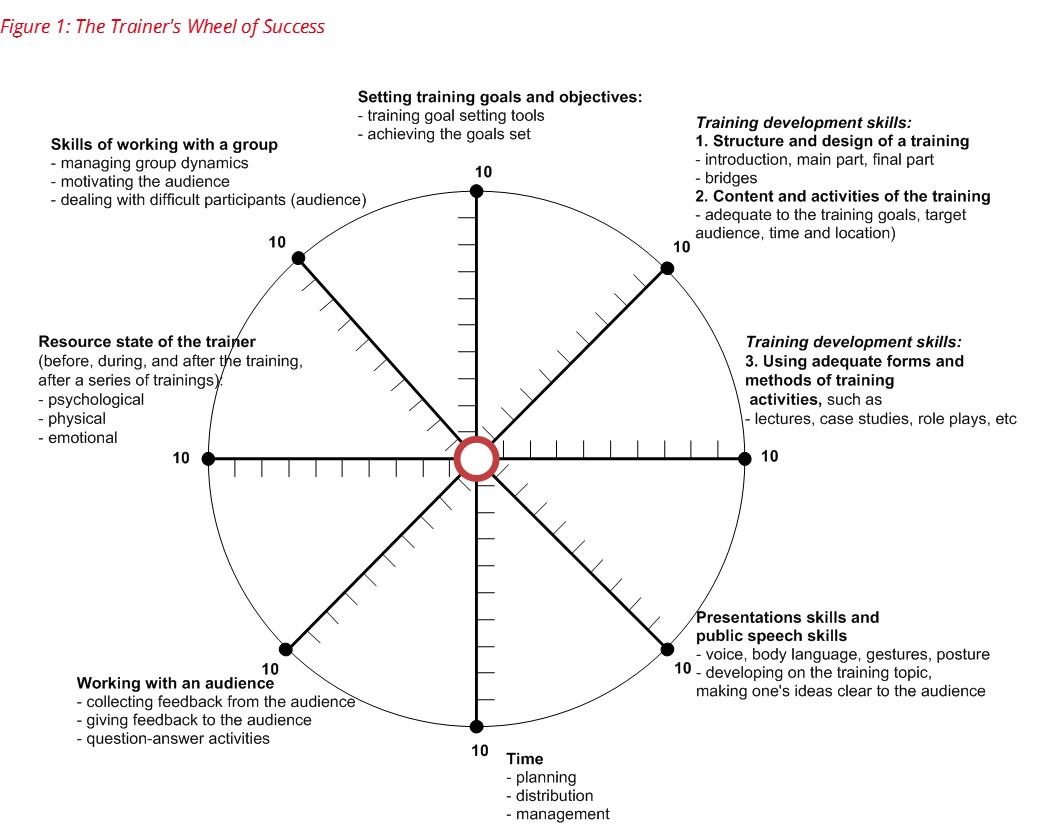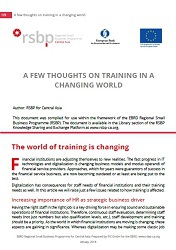The world of training is changing
Financial institutions are adjusting themselves to new realities. The fast progress in IT technologies and digitalization is changing business models and modus operandi of financial service providers. Approaches, which for years were guarantors of success in the financial service business, are now becoming outdated or at least are being put to the test.
Digitalization has consequences for staff needs of financial institutions and their training needs as well. In this article we will raise just a few issues related to how training is affected.
Increasing importance of HR as strategic business driver
Having the right staff in the right job is a key driving force in ensuring sound and sustainable operations of financial institutions. Therefore, continuous staff evaluation, determining staff needs (not just numbers but also qualification levels, etc.), staff development and training should be a priority. As the world in which financial institutions are moving is changing, these aspects are gaining in significance. Whereas digitalization may be making some classic job profiles obsolete as automation of processes takes hold, it is also creating the need for new profiles, new skills and new people: people, who are able to make use of the possibilities of digitalization and people who can do the work that cannot be automated, such as jointly developing tailored product solutions with a corporate business client. All of this has significant consequences for the kind of people needed and for how they should be trained. As a result, HR in principle and staff development and training in particular, are increasing in their importance as strategic business drivers and key to sustainable success of financial institutions.
Ensuring preservation of knowledge and know-how within the institution
Ideally, the process of acquiring new knowledge and retaining already acquired knowledge should never stop. This goes for an individual as well as for a financial institution (or any institution) overall. While this seems obvious, experience shows that the knowledge of experienced staff may be lost as a result of job changes within a given institution or of staff leaving the respective institution for good. In practice, ‘holes’ left by ex-employees are more common than one would have guessed.
In short, in order to build and retain knowledge and know-how, it is necessary to have processes in place for upgrading and retaining know-how. This includes ensuring individuals enhance or at least do not lose existing qualifications as well as ensuring processes for safeguarding that a given institution overall enhances and retains know-how, e.g. through building reserve cadres in a timely manner or developing special courses for refreshing knowledge of staff. But it also means that institutions are thinking about staff in a more strategic manner than before. Staff requirements are shifting to more highly qualified staff. Also, the speed at which actual job requirements are changing is increasing.
All of this means that institutions need to pay more attention to staff selection, staff training and to developing staff over time. This includes paying attention to timing and content of training. It can be rather costly and usually is also not very effective to try and train staff in topics or processes not immediately needed. It is also not as easy as it may seem at first glance (if at all possible) to cross-train staff into new functions. It also means that institutions are having to give more consideration to how to retain staff, i.e. career development planning, evaluation systems, payment systems, promotion systems, etc., as it will not be easy to replace personnel, if lost.
Effective training
Furthermore, the ways in which staff learns are changing. While class room and face-to-face training and coaching remain the preferred option for learning or deepening new skills, simple transfer of information and knowledge can be done more effectively and cost-efficiently by means of online training. - And the younger generations are used to using smart phones and other digital means for procuring information, learning or even practicing new skills in interactive online settings. Last, but not least, institutions need to find ways of training staff without jeopardizing business targets. This means that training sessions should be comparatively short and easy to combine with work. This also entails that combinations of theoretical training and practical training on the job are advisable – not only because of the fact that the trainee can spend more time at work, but also because of the advantages of putting newly acquired knowledge/know-how directly to practical use.
So, to sum up some of the most salient points:
- Just in time: training should be offered to fit with actual job needs to be most effective
- Online training: once set up, online training allows for cost-effective and efficient transfer of knowledge and information. Online training can be effectively used to replace at least part of the classic syllabus of topics especially new employees have to undergo, e.g. topics related to corporate principles, basic learning materials on acquiring, serving and financing clients or similar. As technical possibilities are developing further, online training also allows for effective practicing of newly acquired skills
- Gamification: this is closely related to the above; interactive online games can be used to develop and practice newly acquired skills
- Keep training units short: this increases effectiveness and allows to combine training and work without jeopardizing effectiveness of either the one or the other
- Hybrid training and on-the-job coaching: combining online, possibly class room and on-the-job training allows to put newly acquired knowledge/know-how to direct use – this has proven highly effective in terms of learner success while allowing to control costs and absences from work.
Apart from inviting external trainers, some financial institutions establish their own in-house corporate universities, training centres, or at least delegate training functions to particular specialists. More recently, financial institutions have also started to add online training facilities to supplement other training.
The role and importance of expert-trainers
Usually, trainers working for financial institutions can be grouped as follows:
- Corporate trainers, e. in-house trainers, staff members who administer and implement general training programmes (e.g., "The bank's corporate culture", "Business communication", "Time management", "Effective sales", etc.). The primary function of this type of trainer/HR staff is to organize and implement training. Please, note that this can also include organizing staff participation in certain online training measures and similar.
- Expert-trainers – these are specialists of a particular department of the institution (e.g. SME department) who teach others those things they know and can do well due to their own professional experience and expert knowledge of the subject. For these trainers, training/coaching is usually an additional function, in addition to the duties associated with their day-to-day professional activities. Expert-trainers can also be external experts specifically invited to share specific know-how.
- Experts in developing online training: these are specialists who can convert respective training or informational material into interactive online training.
While all forms of training and types of trainers have their advantages and disadvantages when it comes to cost-effectiveness, effectiveness in actually transferring knowledge and or developing skills it should be noted that corporate universities, etc. and online training – at least for the foreseeable future – cannot meaningfully replace the impact and effectiveness of expert-trainers.
Learning directly from an expert always has been one of the best ways of passing on know-how.
Therefore, we will now turn to some of the methods for identifying, training and developing expert-trainers, i.e. trainers who are knowledgeable in a respective area, have practical experience in this field and are quite capable of passing on this knowledge/know-how and in teaching others on how to do something. Please note, that we differentiated three separate requirements: (theoretical) knowledge, (practical) know-how and ability to train, i.e. to successfully and effectively pass on this knowledge and know-how to others. Finding this combination in staff is not as easy as it may seem. Not everyone who knows how to do something is also good at teaching others. Good teachers may not always have the desired degree of in-depth practical know-how to effectively transfer needed know-how. So the focus needs to be on testing/checking for all three items.
In practice, different financial institutions use different approaches to the development of their in-house expert-trainers.
Suitable candidates
A suitable in-house expert-trainer is an employee who – in addition to sound technical knowledge and practical expertise - enjoys and is talented in passing on knowledge and know-how to others as well as shares the financial institution’s corporate values, understands its philosophy, is aware of the institution’s overall strategy and is ready to follow it. Since, ideally, an expert-trainer does not only conduct training, but also develops training programs, his/her ideas and moral values, motives, and attitudes toward events and people should be in line with those of the institution as trainers actually represent the institution when teaching. When selecting and developing such specialists, special attention should be paid to their interpretation of the institution’s values and corporate culture, their loyalty and attitude towards the institution’s strategy, in addition to screening technical skills, know-how and teaching talent.
Main focus when selecting in-house expert-trainers
Ideally, the term trainer implies that such an expert can implement training but also has knowledge and skills to develop training programs. Financial institutions, however, are often faced with the fact that a corporate trainer, who has general training skills, often lacks specific knowledge and experience to provide training on specialized topics, e.g. analysis of SMEs as compared to micro businesses. At the same time, if we plan to employ for example an SME expert as a trainer, we can be faced with a situation where an excellent professional lacks the personal qualities to be good trainer. In short, financial institutions need to screen for the ability to actually teach others and develop training programs in addition to screening for technical knowledge. This should include teaching in a class room setting as well as – ideally – providing on-the-job training.
Main tasks of an in-house expert-trainer
The range of tasks of an expert-trainer may vary depending on how training is set up at a given institution. Typical tasks of an expert-trainer include:
- Identifying staff training needs, conducting pre-training knowledge testing
- Gathering ideas and planning training courses and programs
- Gathering, studying, and processing data for developing/improving training modules/courses/programs
- Developing training courses/programs, including testing and adaptation, if needed
- Building balanced training programs: developing course material, slides, handouts, tasks, and exercises for knowledge consolidation and skills development (case studies, role-plays, discussions, etc.)
- Conducting workshops, seminars, working groups
- Coaching staff on the job
- Post-training support (Ideally, a trainer would also be able to provide material for subsequent conversion into online training material or would be able to convert material him- or herself)
Expert-trainer selection
Typically, expert-trainers are identified by superiors, who observe staff actually training other staff on the job or as part of staff evaluation by managers and/or by the HR department. It has also proven effective to announce the possibility of becoming a trainer in-house and conduct an internal recruitment process for possible expert-trainers. Like most other professions, a good teacher follows a calling rather than just doing a job, so volunteers, people who like to train are usually more suitable than other candidates – even if they may not yet have acquired necessary didactic techniques, etc.
A candidate for an expert-trainer position must always demonstrate excellent technical expertise on the subject matter in addition to a certain talent for teaching.
After initial identification of candidates based on technical expertise and basic readiness to teach, candidates should be screened more thoroughly by reviewing evaluation results, fulfilment of key performance indicators, possibly interviews or even assessment centers. Assessment criteria should clearly also include aspects related to the candidate’s motivation (interest) in teaching and ability to teach.
Character traits of suitable candidates
Not all technically fit professionals are automatically also good teachers/trainers. Suitable candidates should have the following characteristics:
- Intrinsic motivation to enhance the knowledge/know-how of others/help them approve their skills
- Certain charisma, which allows to spell-bind participants (students)
- Positive attitude towards learners
- Well-developed communication skills, ability to express oneself clearly, concisely and in a structured, easy to understand manner
- Ability to structure information in a logical manner
- Empathy, i.e. the ability to put oneself in the position of the other and a certain broad-mindedness to be able to understand questions or issues learners are grappling with
- Readiness and ability to develop, organize and implement training and training programs
- Ideally, specific qualities or knowledge relevant for the respective area of expertise
Necessary skills
An ideal trainer should be good at methodological work and actual teaching/training/coaching. Apart from profound subject knowledge, an expert-trainer should have:
- Methodological competence — ability to structure content (information/skills/ etc.) and to "pack" them into a concrete training and/ or training program;
- Training competence — ability to effectively transfer or reinforce knowledge, know-how to and build skills in others.
Training of an expert-trainer
In most cases, expert-trainer candidates can be identified who have what it takes to become an expert-trainer in the future. To find somebody who is already a finished trainer is the exception. Regardless of technical expertise in a certain field, developing and organizing training requires certain skills and know-how, i.e. the art of training is a field of expertise as well. In order to be a really good trainer, a trainer should also develop expertise in the field of training.
Most identified candidates will have the talent to develop needed skills and know-how, but will not yet have the knowledge, expertise and skills in training per se. The simplest way to build needed expertise is to put suitable candidates through a train-the-trainer program, where they will learn how to train, how to organize training and how to develop training material and courses. This should be combined with on-the-job training, i.e. being coached by an experienced trainer for some time in training-related tasks. Design and duration of the train-the-trainer program (including coaching) may differ depending on the tasks to be assigned to a given trainer, the institution’s preferences, etc., but certain basic training skills should be covered. Below we provide an example.
After completing initial training as trainer, expert-trainers can then continue to refine and develop their expertise as trainers over time.
Train-the-trainer Example
A bank decided to provide an intensive training course to its trainers. The course will cover basic adult learning tools, group exercises, skills and competencies development assignments, and train-the-trainer methods involving up-to-date concepts.
The Table 1 below lists several modules to be included in the intensive training course:
Table 1: Train-the-trainer modules (a short version)
|
Suggested modules |
|
|
1 |
Fundamental principles of adult learning |
|
2 |
Planning training measures |
|
3 |
Setting learning goals and objectives |
|
4 |
Elaborating seminars/workshops/working groups |
|
5 |
Learning forms and training methods |
|
6 |
Trainer presentation skills development |
|
7 |
Varying the different types of activities during a training session |
|
8 |
Working with an audience (holding the attention of the audience, managing difficult participants, overcoming resistance, question-answer activities) |
|
9 |
Peculiarities of conducting a training |
|
10 |
Pre- and post-training support tools |
One should keep in mind that a training event should always take into account: (a) target orientation; (b) a science-based educational process; (c) a system of teacher-student interaction; (d) evaluation criteria for training results; (e) modern teaching methods, including when and how to use them.
On-the-job training
Following this intensive training course, objectives and plans should be set for the expert-trainer to put newly acquired know-how and skills to use. Initially, this should be done under the supervision of an experienced trainer. This will enhance the further deepening and use of acquired skills in a controlled environment. This serves to prevent misunderstandings of training concepts, etc. or bad practises from taking hold while boosting the confidence of the new trainer in using acquired know-how. In practice, this usually means that a co-trainer (with solid experience) will assist the new trainer in designing training measures and will be present in the classroom when the new trainer implements training. After the respective session, the co-trainer provides detailed feedback. It is the discussion of results, less successful and more successful aspects of the training that will help the new trainer develop and hone his/her training skills. This is mainly based on discussing certain concrete situations, difficult moments, non-standard reactions of students, etc.
The subsequent training process for a trainer should be of a cyclical nature – practice-theory-practice-theory – just like training for any other staff.
The Trainer's Wheel of Success shows the areas of knowledge, competencies and skills that an expert-trainer should develop and reinforce:

Enhancing and retaining abilities of trainers
One last aspect deserves particular attention. In order to preserve, enhance and further develop the expert-trainer’s technical knowledge, know-how and expertise it is crucial that such trainers continue to work in the field and only teach/train part-time. Otherwise there is a big risk that trainers may lose their technical qualification in the respective field(s). Ideally, information awareness and professional knowledge of expert-trainers should be higher than that of students. At the same time, expert-trainers should also implement enough training to stay in practice and further develop their skills as trainers. This obviously also includes undergoing regular theoretical and practical training as trainer.
In order to optimize the system of expert-trainers, work and career development plans for this staff should take this into account and foresee regular training as trainer, implementation of training-related tasks, working in the field and undergoing technical training in their field to retain and enhance know-how and skills. Financial institutions should also give consideration to building up reserve expert-trainers in a timely manner to ensure smooth operations in case of the loss of a trainer.



